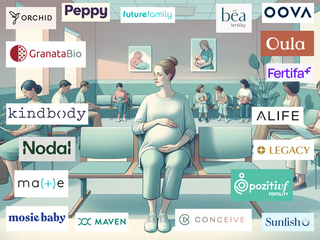
Fertility benefits help your company stand out among competitors
Chanel, Google, Walmart & Starbucks are the frontrunners of this employee benefits trend
A well-rounded benefits package plays a significant role in hiring and retaining the best talent – not to mention reinforcing company values and boosting team spirit. Increasingly, fertility services are integrated into these packages – and for many, these benefits just may tip the scales in favor.

On the side of the employer, infertility coverage can reduce high-risk maternity-related expenses, such as NICU costs, benefiting both employees and the organization. Meanwhile, telehealth programs and at-home options help individuals take proactive steps toward fertility awareness, potentially reducing long-term costs.
Inclusive care has also gained attention as part of a company’s holistic commitments. A diverse workforce preparing to start families receives a message of support when fertility treatment coverage is offered. This reinforces company values and serves as a recruiting tool.
Under these programs, members may get financial support for fertility services such as IVF, egg and sperm preservations, consultations, embryo freezing and transfer, artificial insemination, fertility medications, donor and surrogacy, as well as adoption services. New parents, including adoptive and foster parents, can take advantage of several months of parental leave, depending on the terms.
Some top companies are applying these practices. Tesla and Walmart have partnered with Kindbody, a fast-rising women-owned startup eyeing an IPO. Salesforce and Facebook provide benefits through Progyny. Starbucks is helping cover fertility costs even for part-time employees with a “people first” approach. Adobe’s fertility plans cover as much as 90% for fertility-related services.
Bain & Company offers one of the longest paid parental leaves, between 21 and 26 weeks. Google is also up there, offering 24 weeks off and a quite comprehensive fertility package overall. And while most companies cap their financial assistance, others may offer unlimited coverage for IVF treatments, like Chanel. Some companies, like Bank of America, also include a personal care concierge for 12 months following the birth (or adoption) of a child.
“Providing access to high-quality health care is very important to us, and we’ve heard from our associates that improved access to fertility, surrogacy and adoption support is a priority for them and their families,” said Kim Lupo, senior vice president, Walmart Global Total Rewards, in a September 2022 announcement.
So far, 21 states and the District of Columbia have laws in place that mandate at least some coverage for infertility treatment on state-regulated health plans. But even outside of these states, tech giants and other industry leaders are increasingly enhancing their assistance programs. Infertility challenges can be emotionally taxing. By providing fertility benefits, companies offer a lifeline to employees – and in some ways, keeping them as part of their teams.
This story is part of a recent series covering the fertility innovation industry, including startups changing the fertility landscape, such as Pozitivf, a San Antonio, CA-based clinic that raised $20 million in a recent round, Boston startup Granata Bio, reproductive tech startup Orchid and Quebec-based Genoscience, which provides genetic screening and counseling services.
Image: Wowzer AI


